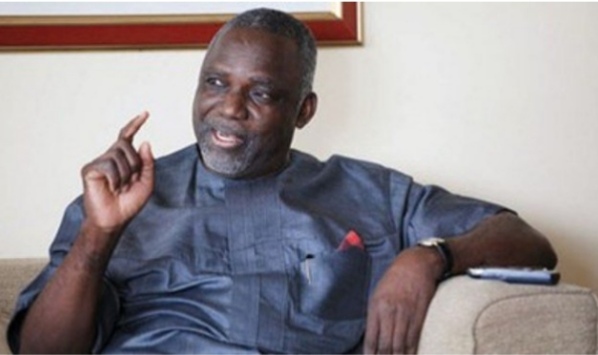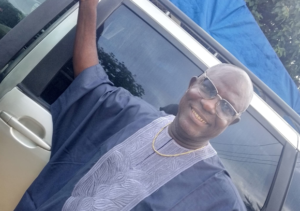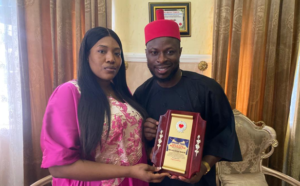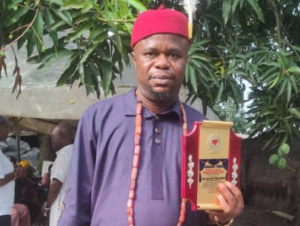With Abia Power Project, Dead Businesses Will Come Alive — Prof Nnaji.
8 min read
The ex-minister also said the success story of the 181-megawatt geometric power plant in the Aba area of Abia State can be replicated across Nigeria to guarantee 24-hour uninterrupted power supply.

The Chief Executive Officer of Geometric Power Limited, Prof Barth Nnaji, was on Channels Television’s breakfast show, Sunrise Daily during the week. He spoke on the just inaugurated 181-megawatt power plant in the Aba area of Abia State. The $800 million project including the building 27km natural gas pipeline, championed by Geometric Power Limited, can generate and distribute 181 megawatts of power. A new electricity distribution company, Aba Power Limited Electric, has started taking electricity from the plant and supplying it to about nine of the 17 local government areas in the South-East state. The power plant which was described as the first integrated electricity facility in Nigeria is located in the Osisioma industrial hub of Aba in Abia.
Excerpts:
Let’s start by asking you, how did you stay on course? Because 10 years, 15 years down the line, many would rather not be sure this is going to happen.
Thank you so much. I can tell you it’s been quite a journey, but once we got started, there was no going back. So it’s just like if you’re on a 100-kilometre journey and you’ve gone maybe 70% of it, you have to finish because when you look backward, you think that there’s so much to lose in going back. So I am quite happy that we were able to start, go through it and complete it.
Is it likely or will investors, or groups face this kind of challenge if they want to do a similar thing in the future?
May be not. When we started, there wasn’t even power reform, there was no private company in play. So, we were the first to start this journey. Perhaps the lessons from our experience would make it easier for others to navigate faster. So, I believe that it shouldn’t take the next 20 years for the next equivalent of our plant to come on stream.
Well, this certainly hasn’t come easy but I’m sure looking at the smile on your face and also seeing just how residents are reacting on X (formerly Twitter), telling us how they’ve had 48 hours uninterrupted, that certainly must give you some satisfaction. But as a journalist, I know this has come at a cost. I remember the controversies that trailed Geometric Power when you were Minister of Power and how, at the end of the day, you had to resign. When you look back at how far you’ve come and this day and what residents are saying, how big a cost would you say it has been to you personally?
The cost is in different ways, I would say. My grey hair is part of the cost. So you can see from it if you measure 20 years on. I would say that the various circles that we encountered gave us strength to continue to progress. In the end, we were able to arrive at this point, the people of Abia are celebrating, and that’s what gives us a lot of joy. Well, that’s what we set out to do. We set out to build a reliable power infrastructure that will endure time, not something that is just start and stop. It is a project that is perpetual in its design and that’s it.
For you, this has been all worth it. It’s been worth the cost?
Yes, it’s worth the cost.
Would you share with us some of the biggest hurdles that you have had to cross in bringing this to realization?
There are some that I don’t want to talk about. Yes, but there are some that I would say the government recognizing that a project of this nature is not about the individual doing it and that it’s a national project. It’s very important because we tend to have an attitude in Nigeria. Why should you be the one doing it? Why should I give you this?
I would say that we are yet in Nigeria to learn how to support private sector investment, we have to be able to do it because the government has a critical role to play in a lot of projects of this nature. Major infrastructure projects require government support and we are not good at that yet. It looks like a gift to people when the government has to give certain approvals, certain waivers that normally would come easily in a lot of countries that desire progress.
It’s really sad to hear when you say that we’re not yet at that place where we can support businesses and support ideas that people have. In your own experience as a minister, what do you think is responsible for this mentality that has made us unable to support businesses and ideas as we ought to?
I can tell you when I was a minister unless the idea is not correct, but as long as it is correct, we will do everything to support it. We tried to find people who were capable of doing certain things and persuaded them to invest in the power sector. The model that we set up is what made Azura come on stream as fast as it did. So, you can imagine that if Azura had to go through the sort of thing that we went through, there would be no Azura today.
So, having been there, and knowing what is required to enable private sector investment, you know what you have to do today shouldn’t wait until tomorrow. We have to move fast. We need a lot of power and we need to move things on as quickly as possible to give support.
You once said Geometric Power is going to provide power to about three million people, which according to you, is equivalent to what Enugu Disco is supposed to provide to the entire South-East. So certainly, it does appear that there is sufficient power now for residents of Aba. What sort of development are you hoping that this would spur in a city we know has been very commercial, very entrepreneurial?
By the time we finish installing, we have 188 megawatts capacity, that’s almost two-thirds of what Enugu Disco is serving five states in the East. The way to ensure reliability is that you have to have more than just adequate power. You have to have more than the requirement of the area. It must be more. So, because you cannot predict peak load for power always, people can just decide to do something and drop power.
But what does it do for the area in terms of development? That is Significant? Do we expect that the existing industries that are just trying to survive will come alive and begin to expand, and grow? Do we expect that some of the industries that are dead will wake up? Do we expect that new industries will come, some will move from different places, some will come from outside the country to Aba? Will the small and medium-scale industries begin to prosper?
Some products are made here that can now be seamlessly done. The leather products industry, for example, very big business area, shoes, belts, and handbags can be made from hides coming from the northern part of Nigeria. Some of the things that used to exist in Nigeria can begin to come alive.
There was such a time when rubber coming from the Midwest would be used to make tyres in Ibadan, in Port Harcourt. Michelin, Dunlop and then brake parts, these bricks. All those things can now be made because of electricity availability.
We just have to recognize that manufacturing hires electricity and that manufacturing ought to be a major contributor to the GDP of Nigeria. If you have a very good manufacturing base, the oil industry is going to be so small in comparison.
We hear the Discos and Gencos talking about subsidies because they say they’re not charging reflective tariffs. So, who knows if the government will insist on that? But how does that apply to you, to Geometric Power?
Well, we haven’t asked for a subsidy because what we focus on is providing reliable electricity. We believe that the people here will pay for power if they get it. And we are a regulated industry. All the distribution company of Geometric Power is regulated, and we don’t charge premium for reliable electricity. But we are confident that people would prefer not to be their power providers and that they would prefer to pay for power.
Now speak to the possibility of such a project as Geometric Power cascading across the country and the contributions such would make to Nigeria’s economy.
Tremendous. It’s a blotter, an ink approach. So, if you drop ink on a part of a blotter, then it begins to spread. And if you drop it at various places, then eventually the entire blotter will have ink. If I look at the project that we have here, you can do the same thing in Lagos. You can do it in Eko, you can do it in Ikeja, you can do it in Kano, you can do it in Kaduna, various places where you have economic activities, industrial activities.
If you begin to look at the possibility of all of them eventually expanding then that’s what can help the country. You need to have a tight generation and distribution, not generation that has no direct relationship between generation and distribution. It is possible for this to be replicated throughout the country. And it will be a very good way to not have to rely on the national grid power arrangement.
Speak to us about the potential, capacity, and challenges that state governments can encounter should they decide to embark on such a project in their states.
That’s a very good question because there is a law, the Amendment of the Electricity Act that is now in force which has given more strength to states to do something about electricity in particular, have regulation, state regulation of power but I think, in some states, this can be misunderstood.
I think that it’s going to be an easy journey to do that because all the electricity infrastructure in Nigeria is privately owned. So for a state government to now begin to build power projects, they either have to work with that private company that is in charge of the network or they have to build their own.
And you have to understand that the network that exists now has been built over many years. Just even in Aba alone, you have thousands of kilometres of network of powerlines and thousands of transformers. So, no government in Nigeria will try to undertake that; you have to partner. Partnership is very important.
There are only two states that have built major power plants in Nigeria and they are Rivers State and Akwa Ibom State.
But the River State power plants have been sold because it’s difficult for a state to run a power plant. So, you have to still get the private sector to do it professionally. The governments can do a lot. The government is an enabler, the government provides support that will make companies cooperating within their states be effective.
Culled from www.channelstv.com




